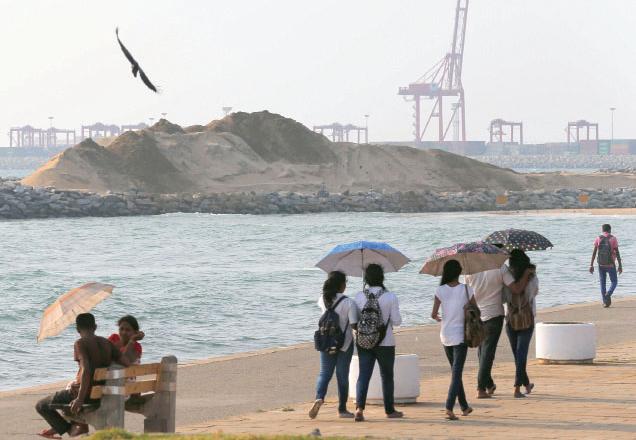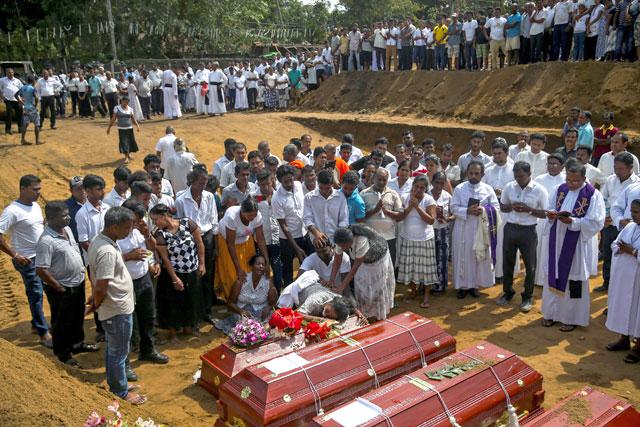You are here
Sri Lanka's economy slows to 4.8% in 2015 as tea party ends
By Agencies - Mar 16,2016 - Last updated at Mar 16,2016

Sri Lankans spend their evening on the Galle Face Green as the China Port City project is seen behind in Colombo, Sri Lanka, on Tuesday (AP photo)
COLOMBO — Sri Lanka's economic growth slowed slightly to 4.8 per cent last year due to a fall in exports of its main commodity, tea, official figures showed on Tuesday.
The figure marked only a marginal decline on 2014, but will add to concerns after international lenders and ratings agencies warned the country is heading for a debt crisis.
Tea production dropped 2.6 per cent during 2015 to about $545 million, the Department of Census and Statistics indicated in a statement, while exports fell by nearly 7 per cent to 306 million kilogrammes.
The declines were offset by services, which grew 56.6 per cent, and industrial output, which expanded by 26.2 per cent.
Last week, the government announced a series of emergency tax increases to combat a debt crisis that has forced it to seek a bailout from the International Monetary Fund (IMF).
Prime Minister Ranil Wickremesinghe has put on hold for one year plans to lower corporate taxes, and has revived a capital gains tax abolished in 1987.
The moves are aimed at repairing the economy, battered by mounting debt repayments that led ratings agency Fitch to downgrade Sri Lanka's credit rating last month.
In a special statement to parliament, Wickremesinghe blamed the previous government for allowing debt to spiral, saying his ministers had uncovered $7 billion in loans unaccounted for in the national budget.
However, the current administration embarked on a spending spree after taking power in January 2015 to deliver on election promises of higher wages and lower prices, increasing the deficit and sparking concern over the balance of payments.
Last month, Sri Lanka received pledges of over $2 billion in loans and equity from the Asian Development Bank over three years.
It is in bailout talks with the IMF, although the sum it is seeking has not been disclosed.
Separately, Sri Lanka announced lengthy daily power cuts nationwide as the staterun electricity monopoly struggled to restore supply after the island's worst blackout in 20 years.
The Ceylon Electricity Board said its main Chinese-built coal-fired power plant that supplied more than half the country's electricity was still offline following a massive system breakdown on Sunday.
"We will need a few days more to get this power station online and this means we need to ration electricity across the country on a staggered basis," a board official told AFP.
Several small plants are now supplying power to the whole of the country until the 900-megawatt plant is restarted, but cannot produce enough electricity to go around.
The cuts will occur for seven and a half hours, five and a half hours during the day and two hours at night, the official said, without saying how long the rationing would last.
Authorities are probing the cause of an explosion and fire at a main distribution centre outside the capital Colombo on Sunday that caused the entire electricity grid to switch off automatically.
Power and Energy Minister Ranjith Siyambalapitiya has said authorities have not ruled out sabotage.
The country, which suffers sporadic power cuts, was plunged into darkness for at least seven hours on Sunday before electricity was restored.
The former government's power minister criticised the Chinese-built plant in 2014, saying it had broken down more than 35 times in the first three years of operation.
Sunday's was the second major power failure in less than a month, following a three-hour disruption in late February, and the worst since May 1996 when the entire country was without electricity for four days.
The latest outage came as an investigation was under way into last month's embarrassing disruption during a visit by New Zealand Prime Minister John Key, who had described Sri Lanka as a shining light in Asia.
In an another development, a Chinese company said Tuesday it will resume construction of a $1.5 billion port city project in Sri Lanka, about a year after it was suspended because of questions about its environmental impact.
CHEC Port City Colombo said it welcomed the Sri Lankan government's decision to allow the project to continue. It said a supplementary environmental impact study has been completed to "understand and fully assess the project's impacts and mitigation measures in developing a comprehensive plan to maximise the benefits".
The city is to be built on reclaimed land off Sri Lanka's west coast and include a golf course, marinas, apartments, hotels and malls.
The project created disquiet in neighbouring India over the possibility China might be allowed outright land ownership. China's influence in Sri Lanka makes India anxious because it considers the Indian Ocean region to be its strategic backyard.
Chinese President Xi Jinping inaugurated the project during a visit in September 2014 during the tenure of former president Mahinda Rajapakse. At the time, Xiwon Colombo's support for a proposed maritime "Silk Road" link between China and Europe.
The leading company in the consortium building the port city is a major Chinese contractor, China Communications Construction Co.
Rajapakse relied heavily on China for infrastructure projects. During his administration, China provided loans for an airport, seaport, highways and power plants, and became the largest investor in Sri Lanka.
The port city project was suspended after Rajapakse lost an election in January 2015. The government of his successor, Maithripala Sirisena, said it wanted to review all projects to ensure they were environmentally viable and corruption-free.
Sirisena's government has also moved to mend relations with the United States and India which were strained during Rajapakse's pro-Beijing administration.
The decision to continue the port project is seen as an effort to reassure China.
Related Articles
COLOMBO — Details began to emerge in Sri Lanka on Wednesday of a band of nine, well-educated Islamist suicide bombers, including a woman, fr
COLOMBO — Crisis-hit Sri Lanka will return to growth this year, the World Bank said on Tuesday, but around a quarter of the country's citize
COLOMBO — Daesh claimed responsibility on Tuesday for the bomb attacks in Sri Lanka that killed 321 people in what officials believe was ret

















